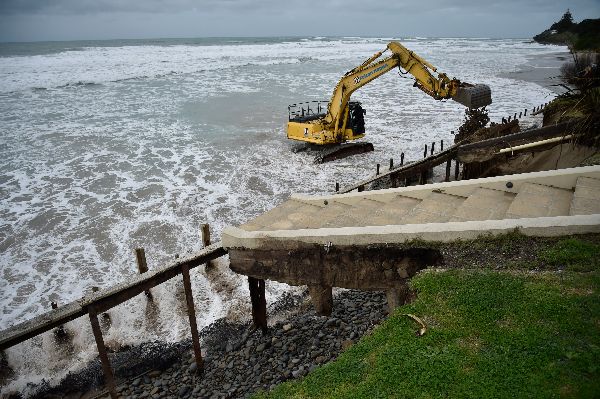
Wainui residents feel left in the dark over Gisborne District Council’s management of erosion at the beachside settlement.
The council has retrospectively applied for a three-year resource consent for the rock wall it built after big seas eroded several metres of land in front of 22, 24 and 26 Pare Street last September, prompting the temporary evacuation of those properties.
The consent application was heard by independent planning commissioner Alan Watson at the council yesterday.
Mr Watson’s decision is reserved, but he said the consent would be granted, it was just a matter of deliberating on its conditions.
Earlier in the day, the commissioner heard from residents who supported the consent application but felt uninformed over the council’s approach to managing coastal erosion at Wainui.
Shane McGhie, the council’s principal consent planner, said the Wainui Beach Erosion Management Strategy was updated in 2012, but the event last September was a trigger for the strategy to be reviewed.
Evidence presented at the hearing showed a consultant’s report regarding a potential review was due to be lodged today, with a decision to proceed with the review then up to councillors.
That was news to Pare Street residents at the hearing, including those who helped update the erosion management strategy in 2012.
Mr McGhie said the three-year term for the rock wall’s consent was partly sought on the basis the review to thrash out a longer term solution would take place in the interim.
Planning consultant Todd Whittaker, acting on behalf of the consenting authority, said it was clear the residents expected the council to be proactive in its management of coastal erosion at Wainui.
They wanted certainty over council policy and practice, Mr Whittaker said.
Pare Street residents told yesterday’s hearing they supported the rock wall but wanted it extended.
The wall was put in front of the three homes that lost land to the sea last year, with adjacent beachfront properties left relying on stone-filled gabion baskets to prevent the surf from undermining their land.
There were also concerns about “end effects” — sand accretion and erosion at either side of the rock wall.
Mr Watson encouraged property owners to keep lobbying the council to carry out necessary protection works, with climate change now a reality.
“There really is a need for council officers and submitters to come together, because you’re dealing with a common issue,” he said.
Mr Watson also recommended the council nominate a staff member to be the point of contact for erosion-affected Wainui residents.
Otherwise, the council risked becoming “a faceless authority”.
“A lot of councils seem to have this idea that people can ring into a helpline or the like, and you get a recorded voice on the phone and they take your complaint or concern on board, but it seems to me (coastal erosion) is quite a specialised area.”



 Ramzy Baroud: No More 'Deals’ - What Palestinians Want And Will Fight To Achieve
Ramzy Baroud: No More 'Deals’ - What Palestinians Want And Will Fight To Achieve  Peter Dunne: Dunne's Weekly - Mayor Whanau's Rare Win - To Her City's Detriment
Peter Dunne: Dunne's Weekly - Mayor Whanau's Rare Win - To Her City's Detriment Binoy Kampmark: Ironic Dependency - Russian Uranium And The US Energy Market
Binoy Kampmark: Ironic Dependency - Russian Uranium And The US Energy Market Binoy Kampmark: Arrest Warrants From The Hague - The ICC, Netanyahu And Gallant
Binoy Kampmark: Arrest Warrants From The Hague - The ICC, Netanyahu And Gallant Ian Powell: General Practice Visits, Emergency Department Presentations, And Social Determinants Of Health
Ian Powell: General Practice Visits, Emergency Department Presentations, And Social Determinants Of Health Gordon Campbell: On The Hikoi Aftermath
Gordon Campbell: On The Hikoi Aftermath